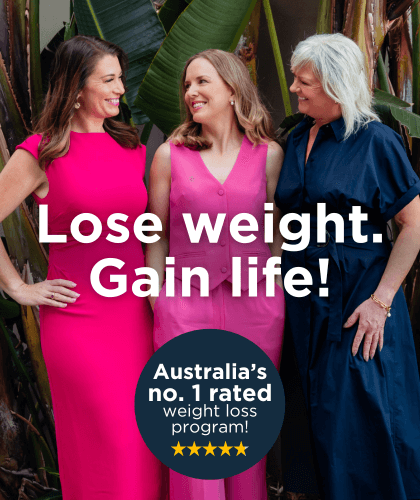The 5 biggest obstacles to losing weight

Losing weight is not only about eating less and exercising more. In fact, our dietitians have found those are less common reasons people give as to why they can't lose weight.
Are you trying to lose weight? Read our comprehensive guide on weight loss to understand where to begin, what happens when you lose weight, and what doesn't work when it comes to dieting.
1. "I don't know what to do"
What's a healthy diet and what's an unhealthy diet is an ongoing and sometimes furious discussion, so anyone can be excused for not knowing how they can lose weight.
With so much 'advice' available online, it's easy to believe there are quick fixes to losing weight or that someone holds a secret solution.
The truth is there is no silver bullet out there when it comes to dieting. A diet based on whole foods from all 6 food groups is the best way to lose weight.
2. "I'm scared of failing again"
For many, dieting becomes a lifestyle, and they end up moving from one diet to the next hoping for better results. This can lead to a loss of motivation because it's easy to think if it's working for everyone else, why not for me?
One problem you may have to address when you want to lose weight is your expectations. By setting your goals unrealistically high, you're also setting yourself up for failure. Unfortunately, weight loss can be a long process, and you may not be one of the rare people who lose several kg per week.
Quitting smoking is a similar process. The more you try, the more you learn, and the better your chance of succeeding.
It's unlikely one diet is going to be the best diet for everyone. People are different and work in different ways. Some people simply don't want to have to cook at home, or exercise, or plan their meals ahead.
3. "Everyday life gets in the way"
The biggest challenge our members report is probably a lack of time. Cooking at home, exercising, and planning ahead can be time consuming and fitting it all into a busy day can feel like an unsurmountable challenge.
The simple fact is (tough love warning!) nobody has time. Nobody has hours each day where they do nothing. Any change to your lifestyle requires some sort of sacrifice.
To eat healthy and be active, you need to be more organised and create a schedule that frees up some of your time.
Create a bank of recipes made from fresh ingredients that are quick to prepare and do some extra cooking on the weekend that you can freeze and eat on days you're extra busy.
Turn parts of your commute into a walking session or take a walk during lunch (bonus: you'll feel refreshed for the second part of the work day!).
Learn more: 9 ways to build more exercise into your day
4. "Fresh food is just too expensive"
Fresh food can be expensive, that much is true. If you're living outside one of the big cities in Australia, it's even more expensive.
But it doesn't have to be - it all goes back to good scheduling. If you've got a week's menu planned ahead, you can buy whatever is in season, which makes fresh food significantly cheaper. Frozen vegetables are also a cheap and healthy option.
The cost of fresh food really depends on what you compare it too. If you're comparing it to eating several takeaway meals a week, then fresh tends to be cheaper. And by eating healthier, you also forego sweets, snacks, and soft drinks, which can cost a lot.
Learn more: How to buy the best fresh produce
5. "I cannot avoid eating unhealthy food"
Unfortunately, bad food is a part of our society. It tastes great and it's cheap to make: cookies and cakes in the office, sausage sizzles at weekend events, drinks and hot chips at the pub, and if you're in a hurry, it's easier to find fast food than a healthy meal.
The way to go about the pervasiveness of fast food is partly to make a commitment to yourself not to eat unhealthy food and partly to understand the situations where you'll be tempted or without another choice.
If you have a healthy breakfast, for example, you won't need a muffin with your coffee in the mid-morning. By eating food that fill you up, like low GI and higher protein foods, you're less likely to be caught out hungry.
If you know you're going to be in a situation where only bad foods will be available, make sure you eat something healthy first so at least you don't end up over-eating.
Learn more: 10 quick afternoon snack ideas
